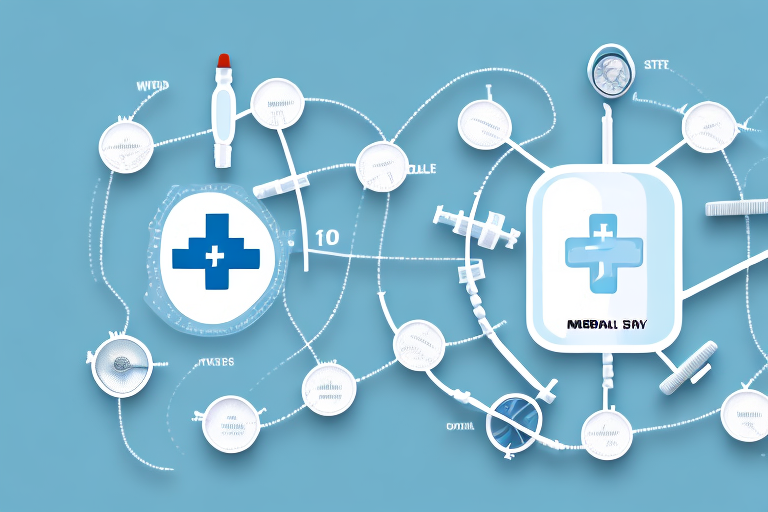Exploring the Benefits of Working With Medical Logistics Companies
In the healthcare industry, the accurate and timely delivery of medical supplies and equipment is essential for providing quality patient care. Medical logistics companies play a vital role in ensuring that healthcare organizations have access to the necessary medical supplies and equipment when needed, and at a reasonable cost. Let's explore the benefits of collaborating with medical logistics companies in greater detail:
Importance of Medical Logistics in Healthcare
Why Medical Logistics Companies are Essential for Healthcare Organizations
Medical logistics companies specialize in the transportation, storage, and distribution of medical supplies, equipment, and pharmaceuticals. Healthcare organizations, such as hospitals, clinics, and nursing homes, rely on these companies to efficiently manage their supply chain, ensuring they have the necessary medical products on hand to treat patients effectively.
One of the key benefits of using medical logistics companies is their expertise in handling specialized medical products, such as vaccines and blood products, which require strict temperature control and handling procedures. These companies possess the necessary equipment and facilities to store and transport these products safely, ensuring their effectiveness and safety for use.
Additionally, medical logistics companies help healthcare organizations reduce costs by optimizing their supply chain and minimizing waste. Utilizing advanced inventory management systems and analytics, these companies can identify areas to cut costs and improve efficiency, such as reducing excess inventory or streamlining distribution processes.
The Role of Medical Logistics in Ensuring Quality Patient Care
Efficient and timely delivery of medical supplies and equipment is a critical component of quality patient care. Medical logistics companies ensure that healthcare providers have access to the right products at the right time. Whether it's a routine order of surgical gloves or a life-saving medical device, medical logistics companies are equipped to handle all types of medical products and deliver them promptly.
Moreover, these companies manage the inventory of medical supplies and equipment using advanced technology and software to track usage and availability, ensuring that healthcare providers never run out of essential items. This not only saves time but also reduces the risk of medical errors and improves patient outcomes.
Streamlining the Supply Chain through Medical Logistics
Management from Procurement to Delivery
Medical logistics companies streamline the supply chain by providing expert management of the entire process, from procurement to delivery. They work closely with healthcare providers to assess supply needs, source products, manage inventory, and optimize delivery routes. This streamlined approach enables healthcare organizations to focus on their core mission of providing quality patient care.
Safety and Security in Transportation
Ensuring the safety and security of medical products during transportation is a critical function of medical logistics companies. They use specialized equipment and packaging to protect products from damage and maintain the required temperature and humidity levels. Compliance with strict regulations and guidelines ensures that products are transported safely and securely, which is essential in the healthcare industry where even minor errors can have serious consequences.
Innovations and Future Trends in Medical Logistics
Technological Advancements
The medical logistics industry is continually evolving, with new technologies and innovations being developed to further improve supply chain management. Future trends include the use of drones for last-mile delivery, predictive analytics for inventory management, and artificial intelligence for route optimization. These advancements will enhance the efficiency and effectiveness of medical logistics companies in meeting the needs of healthcare organizations.
For example, artificial intelligence can analyze vast amounts of data to predict demand and optimize routing, reducing delivery times and costs. According to a McKinsey report, AI-driven supply chains can significantly enhance responsiveness and resilience in healthcare logistics.
Sustainability Initiatives
There is a growing emphasis on sustainability within the medical logistics industry. Companies are exploring ways to reduce their carbon footprint by using eco-friendly packaging materials, optimizing transportation routes, and implementing energy-efficient practices in their warehouses. These sustainable practices not only benefit the environment but also help companies save costs in the long run.
An example of sustainability in medical logistics can be seen in the adoption of electric vehicles for transportation, reducing greenhouse gas emissions. Additionally, implementing recycling programs for medical waste contributes to environmental conservation efforts.
Cost-Effective Solutions
Reducing Supply Chain Costs
Medical logistics companies help healthcare providers save money by optimizing the supply chain and reducing waste. By consolidating orders and shipments, these companies can lower transportation costs. They also negotiate better pricing with suppliers and manage inventory levels effectively, reducing the risk of overstocking or understocking medical supplies.
Value-Added Services
Beyond cost savings, medical logistics companies offer value-added services that further assist healthcare providers in saving money. Customized packaging solutions reduce the need for excess materials and minimize the risk of damage during transportation. Real-time tracking and monitoring of shipments enable healthcare providers to optimize their inventory management and reduce the risk of stockouts.
Implementing sustainable practices, such as using eco-friendly packaging and optimizing transportation routes, also contributes to cost savings by lowering waste disposal and transportation expenses.
Selecting the Right Medical Logistics Partner
Key Factors to Consider
Choosing the right medical logistics partner is critical to the success of any healthcare organization's supply chain management strategy. Key factors to consider include experience, reliability, flexibility, technology integration, and cost-effectiveness. A reputable medical logistics partner can help healthcare organizations maximize efficiency, reduce costs, and provide better patient care.
For instance, a company with extensive experience in handling specialized medical equipment will be more adept at managing sensitive and high-value items, ensuring their safety and integrity throughout the supply chain.
Questions to Ask Potential Providers
Before signing a contract with a medical logistics provider, healthcare organizations should ask several critical questions, including:
- What is your experience in handling specialized medical products?
- What technologies do you use for inventory and order management?
- How do you ensure compliance with healthcare regulations?
- What are your contingency plans for unexpected disruptions?
- Can you provide references or case studies from similar clients?
By asking these questions upfront, healthcare organizations can ensure they are partnering with a reputable and reliable medical logistics provider capable of meeting their supply chain management goals.
Case Studies and Impact of COVID-19
Success Stories of Healthcare Providers
There are numerous success stories of healthcare providers partnering with medical logistics companies to optimize their supply chain management. These partnerships have resulted in better product availability, improved delivery timeframes, and cost savings. For example, a major hospital network was able to reduce supply chain costs by 15% by collaborating with a medical logistics company to source, manage, and deliver medical products more efficiently.
Impact of COVID-19 on the Medical Supply Chain
The COVID-19 pandemic had a significant impact on the medical supply chain, causing disruptions in transportation and increasing the demand for critical medical supplies. Medical logistics companies played a crucial role in ensuring that healthcare organizations had access to necessary medical products despite the challenges posed by the pandemic. The crisis highlighted the importance of having an efficient and reliable medical supply chain during emergencies.
According to a World Health Organization report, the pandemic underscored the need for resilient supply chains that can adapt to sudden changes in demand and supply conditions.
Enhancing Efficiency and Productivity with Medical Logistics Services
Medical logistics companies enhance the efficiency and productivity of healthcare organizations by providing specialized logistics services tailored to their unique needs. From automated inventory and order management systems to real-time tracking and delivery updates, medical logistics companies leverage expertise and technology to optimize the supply chain and improve productivity.
For example, the implementation of automated inventory systems reduces manual errors and ensures accurate tracking of medical supplies, allowing healthcare providers to maintain optimal inventory levels and focus more on patient care.
Maximizing Patient Safety through Effective Medical Logistics Management
Effective medical logistics management is essential for maximizing patient safety. Medical logistics companies take steps to ensure that medical products are stored, transported, and delivered under appropriate conditions to prevent damage or contamination. Tracking and monitoring systems ensure that medical products are delivered to the right location at the right time.
Maintaining the integrity of temperature-sensitive products, such as vaccines, is crucial for ensuring their efficacy and safety. Proper handling and timely delivery directly impact patient outcomes and overall healthcare quality.
Common Challenges Faced by Medical Logistics Companies and Solutions
Inventory Management
Managing inventory effectively is a common challenge for medical logistics companies. Solutions include implementing advanced inventory management systems that provide real-time visibility into stock levels and usage patterns, enabling proactive replenishment and reducing the risk of stockouts or overstocking.
Transportation Delays
Transportation delays can disrupt the supply chain and impact patient care. Medical logistics companies address this challenge by optimizing delivery routes, utilizing multiple transportation modes, and maintaining contingency plans to handle unexpected disruptions.
Regulatory Compliance
Ensuring compliance with healthcare regulations is critical. Medical logistics companies stay updated with the latest regulations and implement robust compliance programs to adhere to standards related to storage, transportation, and handling of medical products.
Adoption of New Technologies
The rapid emergence of new technologies poses both opportunities and challenges. Medical logistics companies overcome this by investing in innovative technologies, training staff, and continuously evolving their processes to integrate new solutions effectively.
Conclusion
Medical logistics companies play a critical role in ensuring that healthcare organizations have access to the medical supplies and equipment needed to provide quality patient care. By streamlining the supply chain, optimizing logistics processes, and implementing innovative technologies, medical logistics companies help healthcare organizations reduce costs, enhance efficiency and productivity, and improve patient safety. Selecting the right medical logistics partner and addressing common challenges head-on enables healthcare organizations to achieve their supply chain management goals and deliver high-quality patient care.




















